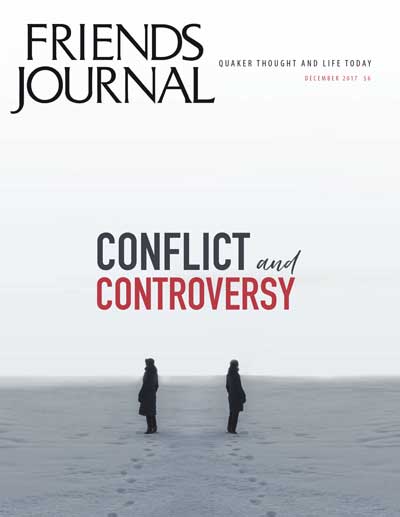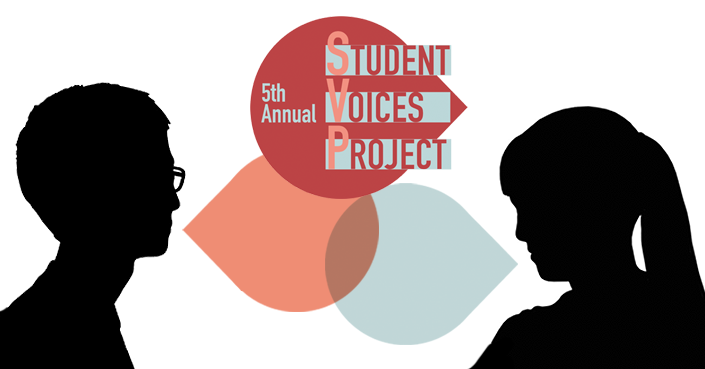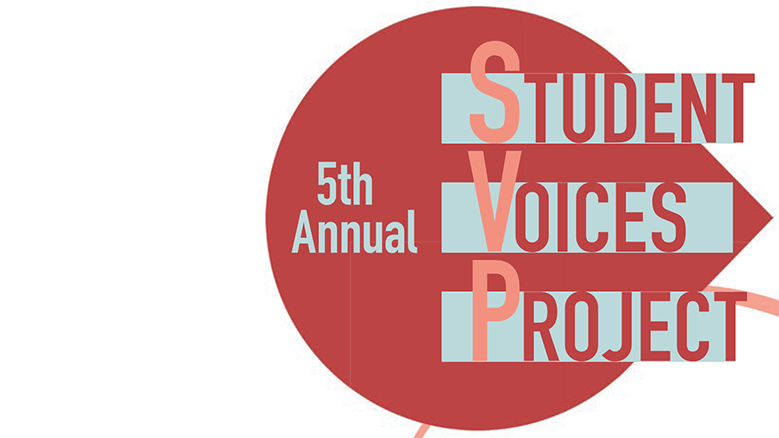Student Voices Project [in box, left column of p 5]
The fifth annual Student Voices Project is underway! This year we’re asking students to tell us a story about how one of the testimonies felt real to them in their life. As in past years, we welcome submissions from all middle school and high school students (Quaker and non-Quaker) at Friends schools, as well as from Quaker students in other educational venues, such as public schools and homeschooling.
2017-2018 SVP Theme: Testimony Stories
Storytelling is one of the most powerful ways to communicate an idea, share an experience, or highlight a revelation. Stories can enable understanding and empathy between two opposing groups, and they can strengthen bonds between those with like minds. Quakers have been telling stories for hundreds of years in order to connect with each other and the wider world about their beliefs and experiences. Many of the most memorable Quaker stories involve our testimonies of simplicity, peace, integrity, community, equality, and stewardship.
Prompt: Tell us a story about how one of the Quaker testimonies was made real to you in your life. We’re looking for true tales that involve you somehow and illustrate how a testimony went from abstract concept to real-life presence.
- Stories must be true and personal with an original title.
- Written submissions only, and they must be typed.
- Word count: between 300 and 1,500 words.
- Submit individual entries via Submittable (link on our website).
Deadline: February 12, 2018
Instructions and details can be found at Friendsjournal.org/studentvoices.
Wisdom in difficult times
Thank you for Dan Snyder’s “Let’s Be Salt” (FJ Oct.). In my struggle with our disturbing current political situation, I’ve reacted with not quite a head-in-the-sand approach, but close to it. Snyder’s piece has helped me consider a different way and given me more hope. I especially appreciated his thoughts on prayer, which speak to my condition. I’ve been following guidelines from Cynthia Bourgeault, as detailed in her book The Heart of Centering Prayer, but this article has added another dimension to my spirituality. Thank you again for your wisdom and enlightenment in these difficult times.
Patricia Johnson
Asheville, N.C.
I found your article to be “bang on!” I am a displaced American, having joined the diaspora of Americans moving to Canada back in the 1960s. I recently returned to my Iowa roots and attended my high school reunion at Scattergood Friends School. I stayed on to attend Iowa Yearly Meeting (Conservative). My family came from Wichita, Kans., and were Evangelical Friends, but my father, Cecil Hinshaw, became liberalized at Harvard Divinity School. He was about as salty a person as you could find, and I am proud of his legacy. My husband and I were directors of Scattergood back in the ’70s, and I can assure you the students of the ’70s are adding their salt to today’s problems and opportunities.
Hinshaw Mullendore
Mabou, Nova Scotia
Combining spirit and action
Some of us resisters in California have been quite taken with Timothy Snyder’s book On Tyranny (“The Advantage of History: An Interview with Timothy Snyder” by Gabriel Ehri, FJ Oct. online). It has been very inspirational for melding spirit and action. Is Timothy Snyder still active and identifying as a Friend?
Barbara
Emeryville, Calif.
I purchased 15 copies of On Tyranny and gave it to family, friends, and associates. One of those bought ten more copies to distribute. This book deserves wide distribution.
John Magee
Warminster, Pa.
Are we losing touch with our testimonies?
Peaceful civil disobedience for conscience in response to war and war preparation is a hallmark of early Quakerism. It seemed to me that we were in danger of losing this powerful testimony when I read that those “willing to risk arrest ranged in age from a youthful 68 to a young 79” in “God Still Speaks to the Quakers” by John Amidon (FJ Oct.). That roughly reflects the age range for those of us in the Brandywine Peace Community who are regularly arrested for attempting to carry a message of peace to Lockheed Martin, the world’s largest war profiteer and nuclear weapons contractor. I notice that all the authors of the four major articles in the October “Conscience” issue are by no means young. It appears that government has been effective in collecting taxes (except from a few, mostly older, war tax resisters who redirect to constructive and peaceful purposes) and using that money to hire a professional standing army and mercenaries to do the nation’s dirty work. On a more positive note, conscience and civil disobedience in the area of environmental activism is attracting a new generation of activists.
Paul and Fran Sheldon
Media, Pa.
My grandfather worked on the atomic bomb in World War II and signed a letter stating it should be demonstrated before being used. When it was used without demonstration, he quit his job and became a missionary for the next 40 years in Pakistan. My father was a conscientious objector (CO) and talked with me about it as I was growing up. When he was in his early 20s, he was drafted to fight in Vietnam. He told them he was a CO, which was a common response then, and they told him if he was serious to fly out to D.C. from California and speak to them in person. He did and was exempted. I turned 18 in 1993, and at the time when I was required to sign up for the selective service, there was not a CO option available. I settled for sending a letter to the Selective Service Office stating my objection while at the same time signing up, so I could be eligible for financial aid to attend college. So somewhere in D.C. is a file with my letter buried away in some forgotten corner. (It always reminds me of Arlo Guthrie and the file he talks about at the end of “Alice’s Restaurant Massacree.”) Talking with youth about options is important, but having an example is invaluable.
Brian Lotze
Fairbanks, Alaska
Martin Kelley’s description of conscientiousness as “inherently anti-social” (“Among Friends,” FJ Oct.) raises a concern. To categorize conscientiousness in this way is to fall into the unfortunate dichotomizing from which we suffer politically, socially, and spiritually: the individual or the society. Our failure to envision the wholeness of each person in community leaves us with unresolvable conflicts grounded in the forced choice of individual freedom or social conformity.
Other perspectives are available. One such vision is that of Socrates, in the Crito, who makes the crucial and subtle distinction between the Athenians who have unjustly condemned him to death and his city of Athens, outside of which he feels he has no life worth living. In the biblical story of Jesus looking over the city of Jerusalem and weeping, saying, “would that you knew the things that make for peace” (Lk. 19:42), another such perspective is present.
Genuine conscientious objection is neither anti-social individualism nor an individual- denying conformity to one’s social group. Rather, conscientiousness reflects the complexity of human relatedness, and how each one of us is a person in community—conscientiously participating and objecting. We are human and so find ourselves on occasion paradoxically both belonging and standing aside by objecting (and weeping). Otherwise, the definition of conscientious objector would be reduced merely to someone with a very high regard for their own opinion.
There are anti-social people. Their objections and participations are motivated by their own self-aggrandizement—either narrowly with their small egos or largely when with inflated egos, they project themselves upon the social or political scene. Such actions are neither “conscientious” nor “responsible,” but fit the “anti-social” description—if we are truly aware of what is being done and what is being suffered.
Robert Gosney
Woodland, N.C.
Understanding the ongoing legacy of Quaker Indian schools
What alternative was there to these policies described by Paula Palmer in “Quaker Indian Boarding Schools” (FJ Oct. 2016)? President Ulysses Grant’s Peace Policy was called that for a reason: in that day and time Quakers pursued and advocated policies that, painful as they often were in terms of unforeseen consequences, represented an opportunity for survival for Native peoples. The alternative was war and genocide. Friends often were responding to requests from Native American elders and leaders. It is unfair and inaccurate to label them as tools of the U.S. government and its policy of cultural eradication. Quakers keenly felt the injustices that were perpetrated upon Native Americans by unscrupulous whites. What would Palmer and others have had Friends do differently in such dire circumstances?
I was also struck by the discussion of the practice of re-naming children. Many tribes gave children names and eventually re-named them using adult names, usually reflecting strengths or positive characteristics. To read that Quakers used English names of people they respected and admired to re-name the children could be viewed as continuing that cultural perspective. We have indeed been given much to consider.
David E. Nagle
Tahlequah, Okla.
Our responses to the Quaker Indian boarding schools are about changing the past. It isn’t about assigning blame; it is about speaking the truth. The truth is that a great amount of culture was lost in these schools. We can frame it any way we want, but that is the bottom line for many. People today still struggle to reclaim that lost culture. It is a wound that has never healed.
There are those who have ancestry both from those who attended and those who ran these schools. It is an internal battle for these people to reconcile that history; the line between Friend and Native is blurrier than some may realize.
For me, this legacy is a lesson to Quakers and to all European faiths to look deeper at themselves: to look at the Indigenous cultures in Europe and what became of them. When we can speak truthfully about what happened to Indigenous culture on Turtle Island, we can apply that to other cultures. We relearn some of the value inherent in an Indigenous worldview.
Marc Snelling
Ottawa, Ont.
Leisurely approaches to social justice
I am most grateful for Barbara Dale’s article “Consensus Decision Making in Eusocial Organisms” (FJ June/July). I share her concerns about our extremely leisurely approach to issues of social justice. I am specifically concerned with mass incarceration and its various causes and ramifications. Too often, when the subject comes up, the response seems to be that it is wrong, it is bad, but it is also complex, and there is nothing we can do about it. We say this even though there are things we can do, and some individual Quakers and a few meetings are in fact doing those things.
So why, when we recognize the evil to prisoners, families, and society, are we not moving more to change the situation? Several queries come to my mind.
Those groups working on racial justice issues seem more interested in examining white privilege in detail than in moving ahead with making conditions better for those who lack this privilege. The thinking seems to be that they cannot move ahead until they have rooted out all vestiges of discrimination in themselves. Is this an accurate assumption? I have heard similar things said about peace—that until one is totally peaceable personally at all times and in all situations, one cannot work for peace. I will go out on a limb and say that historically, if we had really taken that approach, we would never have been able to be a strong voice for peace and against military action.
I have heard various versions of the nice lady described by Dale who said, “Tell me how you feel, but don’t say it too harshly or I cannot hear you.” The lady is assuming that the lack of successful communication is entirely the fault of the speaker. In other contexts, I have heard Quakers accept pettiness, irrelevant criticisms, and—yes—angry expressions. We listen, respond, and work it through. This is not fun. It is time consuming, but it happens to be the way we do things. Unless, of course, it is a person of African American descent who is angry because the most simple and legitimate aspirations of her people have been systematically thwarted.
In fact, there are groups actively working on mass incarceration matters. They tend to be led by African Americans who have been through the prison system and have very clear ideas of what the problems are and of ways to approach improving things. I am sure many Quakers are aware of these groups and are supporting them financially and otherwise. (Perhaps some meetings are doing the same.) Why are not all meetings at least looking into the possibility of doing this?





Comments on Friendsjournal.org may be used in the Forum of the print magazine and may be edited for length and clarity.